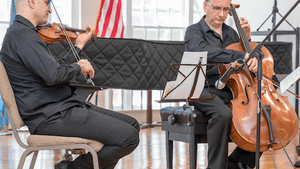Stay in the Loop
BSR publishes on a weekly schedule, with an email newsletter every Wednesday and Thursday morning. There’s no paywall, and subscribing is always free.
Sounds of peace from the Middle East
American Jewish Committee presents ARTolerance

How do you get people to reach out beyond their prejudices and fears? That was the challenge presented at ARTolerance, a concert hosted by the American Jewish Committee (AJC).
Hungry for change
The crowd skewed older. (Who else is free at noon on a weekday?) As they filled their plates with hummus, falafel, pasta, and fresh fruit, I had a feeling they expected the typical schpiel: Israel = good, Arabs = bad. That tired dish wasn't served.
A violinist, cellist, and percussionist, all dressed in black, walked onstage. Without explanation or introduction, they proceeded to take the audience on a musical journey that erased the highly disputed borders of the Middle East. Jewish and Arab melodies wove together seamlessly, expressing all the emotions of the region’s tumultuous history: Unbearable sorrow, joy, and hope. Each passing mood was reflected in the musicians’ faces as they exchanged nods, smiles, and laughter.
The audience didn’t know it but they had just received their first lesson in listening with respect to those with whom they do not agree. Ohad “Udi” Bar-David, a Jewish Israeli who is founding director of ARTolerance and a cellist in the Philadelphia Orchestra, introduced his fellow musicians: Arab-Israeli violinist Hanna Khoury, musical director of Al-Bustan Seeds of Culture and the Arab Ensemble at Penn, and Syrian/Venezuelan percussionist Hafez Javier Kotain. Bar-David then explained that he and Khoury perform in Palestinian villages, Israeli military bases, and schools to break down stereotypes and misconceptions.
“I believe that music can be a force for positive connection in a world too often polarized and divided by religious and social boundaries,” Bar-David said. A hand shot up.
“How did you meet?” a woman asked, as if cross-examining an Israeli son who'd brought home two Palestinians for Thanksgiving.
Bar-David smiled. “It’s been so long,” he said. “But I believe I met Hafez at a Latin music event and he introduced me to Hanna, with whom I’ve been performing for many years.”
Seeing both sides
Khoury, who received his master’s degree in music from Temple University and can be heard on recordings by Shakira and Beyoncé, recalled growing up in Israel. “My first contact with a Jewish Israeli was my violin teacher when I was seven years old.”
Bar-David admitted that his first awareness of Israeli Arabs was not so subtle. “As a child, I was taught Arabs are the enemy. You do not look at them. They simply do not exist.” What changed his attitude? “As a musician, you develop a common language that transcends all differences. I became very interested in Arab music, which is much more complex than classical Western music.”
Bar-David then asked for a show of hands. How many people had met an Arab before? A half-dozen hands went up. How many had never met an Arab? More hands rose. “Well, now you have,” he said.
A lively discussion followed on how to have a dialogue with someone whom you may perceive as the enemy: Suspend judgment, listen with respect, realize the other person shares your most fundamental priorities. They also want their family to thrive.
As I waited in line for the restroom, a woman behind me muttered, “That won’t work with a Trump supporter.” But I have to wonder: has she ever really tried?
What, When, Where
ARTolerance. Ohad Bar-David, cello; Hanna Khoury, violin. "Ma Omrot Einaich" by Mordechai Zeira; "Hora Mamtera" by Moshe Vilensky; "Volich," traditional Klezmer melody; "Longa Shahnaz" by Adham Afandi; "Yafo" by Moshe Vilensky; "Dance Mediterrania" by Simon Shaheen; "Longa Farahfaza" by Riad al Sunbati; "Spain" by Chick Corea. American Jewish Committee. May 17, 2017, at the Ethical Society, 1906 S. Rittenhouse Square, Philadelphia. (215) 735-3456 or phillyethics.org.
Sign up for our newsletter
All of the week's new articles, all in one place. Sign up for the free weekly BSR newsletters, and don't miss a conversation.

 Stacia Friedman
Stacia Friedman